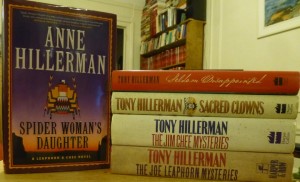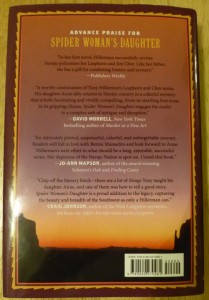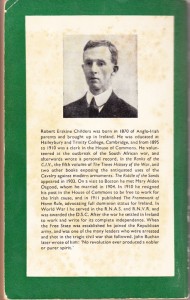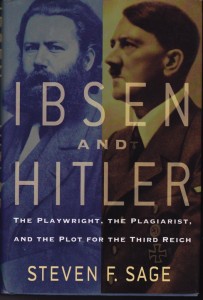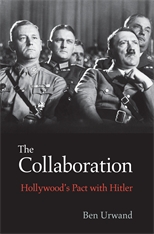#FridayReads, Oct 11–Ben Urwand’s “The Collaboration: Hollywood’s Pact w/Hitler” & Anne Hillerman’s “Spider Woman’s Daughter”
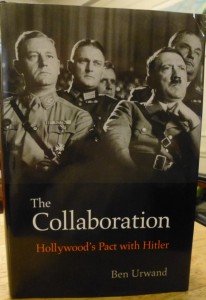 #FridayReads, Oct 11–Ben Urwand’s The Collaboration: Hollywood’s Pact with Hitler & Anne Hillerman’s Spider Woman’s Daughter, a new installment in the long-running Joe Leaphorn and Jim Chee mystery series established by her late father, the mystery master Tony Hillerman.
#FridayReads, Oct 11–Ben Urwand’s The Collaboration: Hollywood’s Pact with Hitler & Anne Hillerman’s Spider Woman’s Daughter, a new installment in the long-running Joe Leaphorn and Jim Chee mystery series established by her late father, the mystery master Tony Hillerman.
—
Notwithstanding the controversy I’ve reported on earlier that’s greeted publication of The Collaboration, which I had made part of my #FridayReads a few weeks ago, I have been continuing to methodically read it, even while still reading fiction. It’s ironic about all the hubbub, because I am finding it so far, about 80 pages in, an unsensational, moderately engrossing and well-documented account.
The narrative opens by examining “All Quiet on the Western Front,” the 1930 WWI drama released by Universal Pictures that to German officials, dangerously advocated pacifism while also showing cowardice and dishonorable conduct by their troops. The government, two years before Hitler was to win power, viewed it as a threat to to the nation, and sought to have whole passages of the film cut, scenes changed, and dialogue rewritten. They threatened to remove it from all German screens, and to make it harder for other American pictures to be exhibited in Germany.
After this key opening example, the book becomes a chronicle of the willing cooperation of some American film industry executives–who along with a number of American functionaries and bureaucrats, and at least one Jewish communal organization, the Los Angeles branch of the Anti-Defamation League–worked to suppress American-made movies being produced about contemporary Germany. Some of this suppression was triggered by German trade officials who after the Great War’s ignominy zealously attacked films from foreign countries that seemed to hyper-sensitive German governments (even preceding Nazi rule) prejudicial against their country and “damaging to their reputation abroad,” or potentially “demoralizing to morale” at home, as they put it, as with “All Quiet on the Western Front.” Hitler was an enthusiast of cinema and theatrical performances of all kinds, as earlier shown in a book I edited and published, Ibsen and Hitler: The Playwright, the Plagiarist, and the Plot for the Third Reich. Once Hitler was in power, with hyper-awareness of both the positive and the damaging effects of propaganda, he focused his regime on how messages might be spread by movies. With that, the Nazis began even more aggressively lobbying foreign filmmakers to alter the scripts of movies in production, or edit and recut ones already being exhibited on German screens.
For a rundown of the controversy surrounding the book and the overheated things some of its critics have said about it, please see my recent post, Questioning the Critical Reaction to Ben Urwand’s “The Collaboration: Hollywood’s Pact w/Hitler”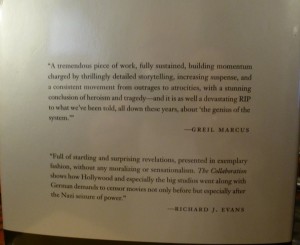
A Second #FridayReads, Spider Woman’s Daughter, Anne Hillerman’s new Joe Leaphorn and Jim Chee Mystery Novel
While reading The Collaboration, I am intercutting it with Anne Hillerman’s Spider Woman’s Daughter. I’ve read and loved the Leaphorn and Chee series for years, and made his 1982 book Dark Wind one of my #FridayReads last year.
Tony died in 2008. About the revival of the series, Anne has written, “When I emerged from the worst of my grief after Dad’s death, I realized that I was also mourning the end of his mystery series. I missed those detectives [Leaphorn and Chee], and I especially regretted that Bernadette Manuelito would never get a book that put her in the spotlight. And then I thought: I could try writing Bernie’s book myself. . . .In addition to Tony Hillerman’s Landscape, I had written several other books, so I knew part of the challenge that faced me. I jotted down some ideas as a rough outline and got to work.”
I’m loving her new book. The protagonist, Bernadette, is a young police officer in Navajo Country, married to Jim Chee, who learned how to be a cop under the tutelage of Joe Leaphorn, wise man of the tribal police force. She witnesses a startling assault on a fellow cop in the book’s opening chapters, which forces her to the sidelines of an important investigation. Despite her chief’s order to drop any involvement with the case, she continues trying to riddle it out, even while Chee and her fellow officers pursue every lead. Bernie’s unauthorized efforts take her all across the dramatic landscape of Navajo Country, speaking with people who may help her understand what’s really going on. Just as in Tony’s books, the sense of place and people is indelible.
Coincidentally, over the summer, working as literary agent for author J. Michael Orenduff, I licensed his 6-book POT THIEF mystery series to Open Road Integrated Media who will publish them in ebook and print editions in January 2014. The books are are set in and around Albuquerque, New Mexico, and feature dealer in Native American pottery Hubie Schutz. They’re titled The Pot Thief Who Studied Pythagoras, The Pot Thief Who Studied Ptolemy, The Pot Thief Who Studied Einstein, The Pot Thief Who Studied Escoffier, The Pot Thief Who Studied D. H. Lawrence, and The Pot Thief Who Studied Billy the Kid. When not digging in the desert for ancient pots, or crafting copies of artifacts with his own hands, Hubie’s usually absorbed in reading a classic text. In their earlier editions, the POT THIEF books won numerous awards and raves from mystery readers, including this one from Anne Hillerman herself: “I inhaled this book. Witty, well-crafted and filled with unexpected plot turns, The Pot Thief Who Studied Billy the Kid will delight J. Michael Orenduff’s many fans—and win him new ones.”
It’s a small world out there for mystery writers and readers and I’m really excited that Anne Hillerman’s brought back her father’s great characters, and that fans of the Leaphorn and Chee books will soon be able to discover and enjoy the POT THIEF mysteries.